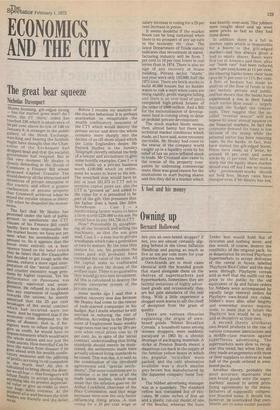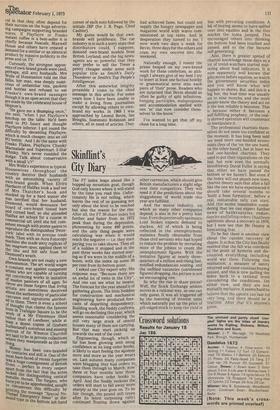A fool and his money
Owning up
Bernard Hollowood
Are you an own-brand shopper? If not, you are almost certainly slip ping behind in the Great Inflation Handicap and paying as much as five or ten per cent more for your groceries than you need.
Own-brands are in most cases identical with the branded goods that stand alongside them on the shelves of supermarkets and hypermarkets. Sometimes they are faithful imitations of highly advertised goods and occasionally they are but pale simulacra of the real thing. With a little experience a shopper soon learns to sift the chaff of deception from the grain of quality. There are various theories explaining the origin of ownbrand goods. 'Nibbet Breakfast Cereals,' a household name among women shoppers, were suddenly paralysed in 1963 by a chronic shortage of packaging materials. A strike at Preston Boards meant a disastrous cut-back in the supply of the familiar yellow boxes in which the popular `ricicubes' were packed, and the only alternative available was a much smaller grey-brown box manufactured by the Japanese company Sumi Tenko.
The Nibbet advertising manager was in a quandary. The standard yellow box contained 5oz of ricicubes, 96 cubic inches of free _air and a plastic cut-out model of one of the Beatles, whereas the Sumi
Tenko box would hold 5oz of ricicubes and nothing more, and this would, of course, destroy the credibility 'of the original pack. So in desperation he invited Playfayre Supermarkets to accept deliveries of the cereal in boxes labelled 'Playfayre Rice Cubes' and the deal went through. Playfayre cereals sold so well that the outfit cut the price to the public by the old equivalent of 3p and future orders for Nibbets were accompanied by equally large renewal orders for Playfayre own-brand rice cubes. Nibbet's were able, after lengthy and somewhat stormy negotiations, to insist that in future the Playfayre box would be as large and as deceptive as their own.
A second theory attributes own-brand products to the rise of various consumer associations and a middle-class reaction against superfluous advertising. The supermarkets were slow to recognise this trend, but when they did they made arrangements with most of their suppliers to deliver at least half of the goods ordered in ownbrand packs.
Another theory, probably the most accurate, maintains that own-brand goods were the supermarkets' answer to secret pricefixing agreements by the manufacturers of supposedly competitive branded items. It should not, however, be overlooked that ownbrands are to some extent parasiti cal in that they often depend for their success on the huge advertising campaigns supporting branded wares. If Playfayre or Fresko instant coffee is a best-seller it is chiefly because Nescafe, Maxwell House and others have created a demand for a similar or an identical product by massive publicity in the press and on TV.
Curiously, the strongest opponents of own-brand goods were (and, Perhaps, still are) husbands. Mrs Wells of Hunstanton told me that Billie, her man, was deeply suspicious of unfamiliar tins, packets and bottles and refused to eat Fresko's own-brand sausages though it is an open secret that they are made by the celebrated house of Skipton's.
"He gave me a thumping once," she said, "when I put Playfayre 's ketchup on the table. He'd been used to PO Sauce and thought Playfayre inferior. I got round the difficulty by decanting Playfayre, Which is much cheaper, into an old PO bottle. And I do the same with Fresko Flakes, Playfayre Chunky Marmalade and Supermart 3-Star Whisky. He's never rumbled the dodge. Talk about conservative with a small 'c'!" Mrs Wells's experience is typical. Housewives throughout the country deceive their husbands With an astonishing variety of own-brand goods. When Elvira Hardacre of Halifax took a leaf out of Mrs Thatcher's book and stocked up for a hard winter she was terrified that her husband, Desmond, would denounce her hoard of own-brand tinned ham and corned beef, so she attended Halifax art school for a course in commercial art until she felt com petent enough with poster paints to reproduce the distinguished 'PeterYork' label with its porcine trade
mark. Then with an Acra Fotocopy machine she made sixty replicas of her magnum opus, applied them to the tins and felt safe from her Desmond's wrath. Own-brands are not really a new Phenomenon. The art world wages
a constant war against competent artists who are capable of turning out convincing works in imitation of master painters of all ages. So clever are these forgers that living artists are sometimes deceived about the authenticity of particular
canvases and signatures attributed to them. There is even a school
Of thought that claims the famous lions in Trafalgar Square to be the work of a Mr Finnemore Shad rather than of Landseer, while at least a dozen copies of Graham Sutherland's notorious and missing portrait of Sir Winston Churchill are said to be in private collections
Where they masquerade as the real thing, _ Money has been own-branded tor centuries and still is. One of the most bare-faced of recent forgeries Niyas a huge consignment of British ivers — perfect in every respect Npart from the fact that the notes lacked the distinguishing vertical metallic thread. The forgers, who thave yet to be apprehended, sought o circumvent this difficulty by printing the message "Special No
read Emergency Issue" in diamond type in the bottom left-hand corner of eadh note followed by the initials JBP (for J. B. 'Page, Chief Cashier). My guess would be that ownbrands will proliferate. The car industry is in such a sorry state that distributors could, I suppose, demand own-brand models from British Leyland; and the big newsagents are so powerful that they may prefer to sell the Times a penny cheaper under some such popular title as Smith's Daily Thunderer or Smith's Top People's Intelligencer. After this somewhat lengthy preamble I come to the chief message in this article. For some years now I have been unable to make a living from journalism except by allowing others to ownbrand my works. In 1968 I was approached by Leonid Bevin, Ian Bringlis, Sostenuto Robinson and others, all in need of articles. They had achieved fame, but could not supply the hungry newspaper and magazine world with wares commissioned at top rates. And in desperation they turned to me. I now work two days a week for Bevin, three days for the others and cram my own oeuvres into the weekend.
Naturally enough, I resent the praise heaped on my own-brand work for these celebrities, so although I always give of my best I try to insert at least one factual howler or grammatical error into each piece of 'their' prose. Readers who are surprised that Bevin should so often be guilty of split infinitives, hanging participles, malapropisms and accommodation spelled with one 'm' can now consider themselves 'in the know.'
I've wanted to get that off my chest for a long time.



































 Previous page
Previous page